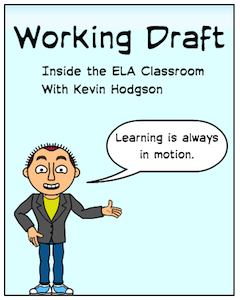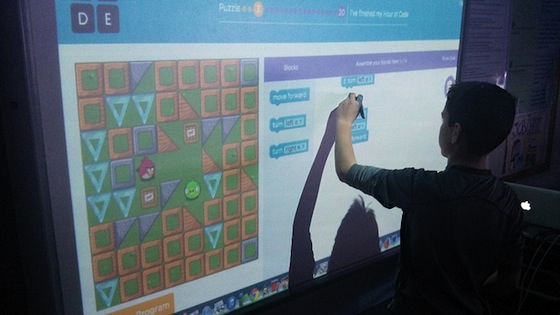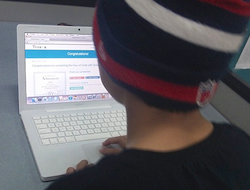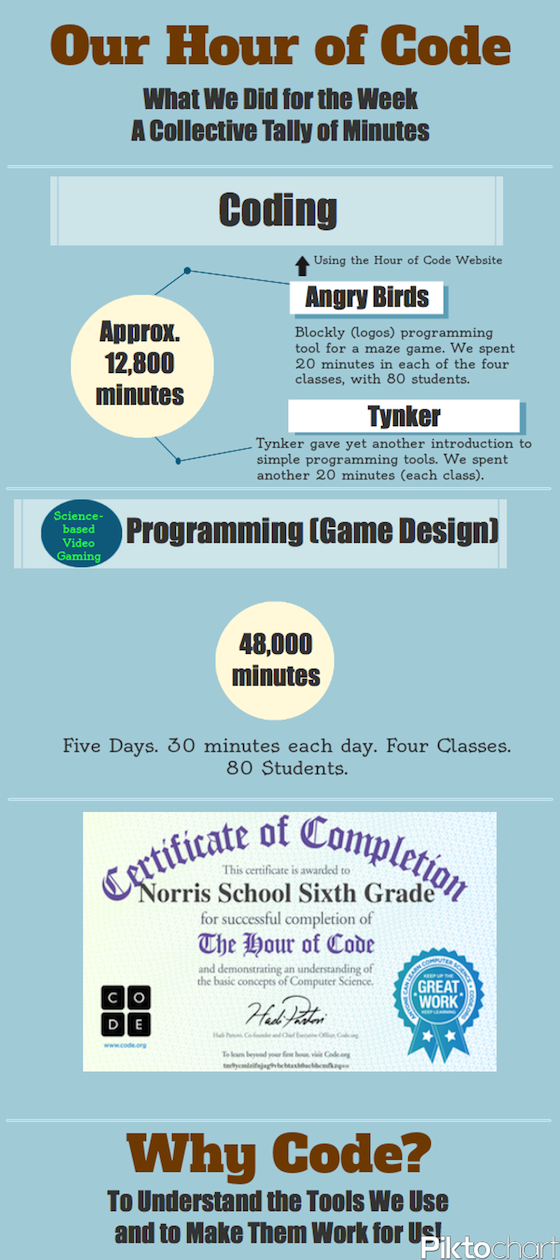Why Coding Is Important in Our Writing Class
A MiddleWeb Blog
 We were in the midst of moving the oversized red bird around the maze to capture the evil green pig, using block-style programming codes up on the interactive board, when one of my sixth grade students raised her hand and asked the inevitable question: “Mr. H, why are we learning about computer programming in writing class? Why do we need to know this?”
We were in the midst of moving the oversized red bird around the maze to capture the evil green pig, using block-style programming codes up on the interactive board, when one of my sixth grade students raised her hand and asked the inevitable question: “Mr. H, why are we learning about computer programming in writing class? Why do we need to know this?”
It was a question I was ready for. Here we were, participating along with millions of other students around the world in the Hour of Code initiative. The aim: expose students to at least one hour of computer coding and programming during a week in December.
We were doing a combination of activities over the days of the week, ranging from using some of the entertaining tutorials at the Hour of Code site (including the Angry Birds game), programming with Gamestar Mechanic for our science-based video games, and using a site called Tynker to learn about animation.
How does all this fit into a writing class? Here’s how.
Our world is in the midst of incredible change, and the way we compose and the way we write and connect and communicate with others is changing right along with it. Information (and knowledge) is no longer just words on paper, bound in books. Media and technology are becoming more and more an integral fabric of our being, as we google facts, upload videos, send texts, crowdsource ideas and share shards of our lives in social networking spaces.
And yet, as music producer Will.i.am so eloquently put it in a video we watched in class, while the world has become increasingly dependent on technology for everyday tasks, “…none of us know how to read and write code.”
Listen to a podcast of this post
We need to pull back the curtain
We don’t understand what goes on behind the veil of technology. We’ve somehow settled into the role of being just users of information, and not always creators of ideas. While the world is opening up incredible new possibilities, very few of us understand the framework being activated behind the screens that we press with our hands and tap into on our desktops.
If we don’t understand the basics of how it all works, how can we bend technology to do what we want it to do? We need to understand the architecture of the media in our lives. We need to know why something does what it does, and how to adapt it for what we want it to do. We need to be educated.
I don’t expect all of my students to become software programmers, nor do I think many are going to take the time to learn how to use Java and Python and even Logos, although I was pleasantly surprised to see one student passing his Java Programming for Dummies to another student during the week. Yet I do think it is vitally important that they have a conceptual idea of what is going on when they power up their devices and start to use the technology.
We shouldn’t relinquish that agency to the “age of technology.” We can’t give it up out of some willing ignorance of the way things work or with a shrug at the complexity of machines in our lives.
I’m not warning of some robotic revolution from dystopian fiction. I’m talking about knowing what we need to make our lives better and manipulate our world to make things happen. I’m talking about humanizing our experiences with the changing technology.
Technology is powered by writing
So, yes, coding is composition, and reading and writing programming languages on even a very basic level belong in the writing classroom as much as in the computer science class. Is there any doubt that the workforce that my sixth graders will enter in a decade or so will be highly technical and that those who understand the technology will have a leg up on those who don’t? I have no doubts whatsoever.
This is how I replied to my student’s question, in kid-friendly language. I challenged them all to dive deep into this world they knew very little about before the Hour of Code began, and to come out the other side with at least a rudimentary understanding of how technology is powered by writers and writing. I believe they did.







































Kevin, I am very interested in this post (and in the topic more broadly). I am a former middle school Science teacher and current Teacher Educator focused on STEM-D Education.
I was wondering if you have seen any benefits to things like grammar and syntax and writing planning as a result of your students’ working with coding.
That is a great question, Gerald. I have not seen much in terms of grammar/mechanics, but I suppose I have seen the way it comes into play around planning and conceiving an idea. Honest: that is anecdotal. We have not “gone to code” completely, so to speak, in that we do some programming and some coding but I can’t say we are fully immersed in it for any long length of time.
If we were doing a long coding project (where lines of code had to be written and tested and iterated), I suspect I might see more engagement in the grammar elements that you ask about. Maybe. I’m not sure.
Kevin
Kevin,
Thanks for your response.
I look forward to hearing further insights as you continue this work.
Love this and couldn’t agree more! Congratulations to your class for completing the #hourofcode! They’re lucky to have you help them get a leg up :)
Hey! I follow you on Twitter! Awesome post. I’m looking forward to blogging about coding with 1st and 2nd graders at our school. I love how you connected writing. So smart!
can u teach adults so we can understand our kids
Kevin,
Have you looked at CMU’s ” Learning to program with Alice”? Great set of instructional materials for teaching fundamental programming concepts! Some schools have used this to teach elementary students. You’ll also find an awesome community of teachers across the world ready to help each other.
Hi Kevin,
Thanks for sharing about your experiences with the Hour of Code. We participated too and had a great time! I really agree with your point about the importance of understanding what makes technology work. Also, cool parallel between composition and coding (I’m a language geek)! I just wrote a blog post about taking coding and programming to the next level, and I mentioned your post: http://techiestateofmind.blogspot.com/2014/01/taking-coding-and-programming-to-next.html
Thanks again for sharing!
Andrea
Kevin,
I also had my 6th grade students try the Hour of Code in December as well and we are now working our way through the K-8 Computer Science course offered on the learn.code.org website. They are loving it and many of them asked me the same question since we used http://www.typing web.com in the fall to relearn keyboarding skills (they learned in 3rd grade and then forgot it). Students wanted to know what coding has to do with typing and I told them that this is where the best jobs will be in the future.
One of my spec. ed. kids who was always behind on the typing course told me that he wants to be a computer programmer someday since we did the Hour of Code. That is a big step up for him….Yeaaahhh (This is what teaching is all about…when the “light bulb” pops on).
I was wondering how I would get the rest of the MS teachers on board with this course. Thanks for the ideas to show my Comm. Arts teacher.
Kevin, you bring up some very good points. This one resonates with me: “We’ve somehow settled into the role of being just users of information, and not always creators of idea.” This is a key question to ask all teachers if we want our students to own their learning.